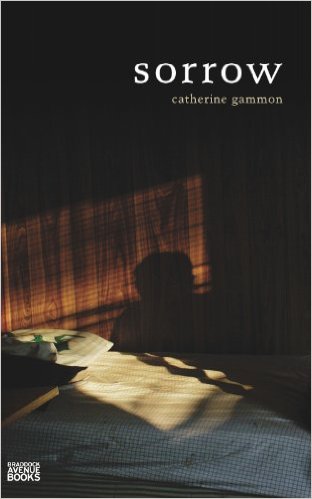Sorrow
Capsule review: Sorrow (Braddock Avenue Books, 2013) is literary fiction which I probably wouldn’t have read if I didn’t know Catherine. That would have been my loss. It is a tragedy, told without shying away from its own darkness, in simple, powerful prose. It takes courage to read but is well worth it. Buy it. Read it.
Full Review:
Catherine Gammon was one of my teachers in my MFA program at the University of Pittsburgh, and she was excellent. I learned so much from her and still hear her voice when I am revising nearly anything. The job search for her position was held during my first year, and the writing students and faculty were all blown away by her prose, which pushed limits emotionally and structurally with nary a wasted word. As a teacher, she pushed me to take creative risks I would not otherwise have done. I had read her first novel while I was in grad school, before I knew her as a person, and kept hoping for another.
When it finally did come out I bought it early and then let it sit on my shelf for well over a year because I was afraid it would be too intense to read while I was deeply involved in my own writing. I was afraid of the intensity because I knew the subject matter was dark (the title alone says it all), and I didn’t know if I wanted to go the places Catherine’s writing would lead me. Last week I finally read it, and was blown away.
The plot line is simple – one of the residents of an apartment building is murdered, and people have to deal with the sometimes devastating consequences. At the core of the narrative is childhood sexual abuse. It is set in New York City during the Gulf War.
The reader is taken into the minds and spirits of several people: the young woman Anita Palatino, who is the central character; Cruz García, the building manager; Tomás, Cruz’s Salvadoran cousin who has come to the US illegally to work and send money home; Magda Ramírez, a widow; Monica Luz, a nun; and Sydney Booker, a police detective. The characters are all in their own ways in pain, sorrowing for what they lost or what they think they will never gain: love, home, family, peace. In the background there is always the murmur of war.
I’m trying to be spoiler free here, which is difficult to do without watering down the review. You know early what is going to happen and why; but the novel unfolds, layer after layer, spiraling down into the darkness, unflinching. Parts of it are uncomfortable and painful. The descriptions of sexual abuse are harrowing; so, in a different way, are Tomás’s memories of El Salvador and Magda’s loneliness.
The horror that lies at the center of the novel is made bearable to the reader by virtue of the prose. It was a page turner for me, not so much because I wanted to know what happened next as because the words led me relentlessly along, like a magnetic force. Simple words, plain words, in simple structure; and inescapable:
He had refused to look, but the image of her burned in his eyes, in his body. Love? He had seen her eyes, black in the darkness, black with desire. He had covered her and covering her had felt her in his hands, under his hands, had felt the touch of her skin.
Reading, I was reminded most of Cormac McCarthy, who is dark and spare and compelling. Sorrow also made me think of Patricia Highsmith’s Strangers on a Train in terms of plot, psychological probing, and use of language. The novel is intended as a kind of Crime and Punishment; not as a retelling of Dostoevsky, but as a psychological novel where the suspense lies in the internal responses to the act of murder. As in a Shakespearean tragedy, murder is not justified or excused, but the sorrow that can lead to it and that leads from it is laid out bare. And along with it, compassion.
